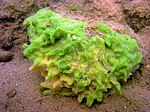esponja
See also: esponjá
Catalan
Pronunciation
Etymology 1
From Latin spongia, from Ancient Greek σπογγιά (spongiá).
Noun
esponja f (plural esponges)
Related terms
Etymology 2
See the etymology of the corresponding lemma form.
Verb
esponja
- Lua error in Module:romance_inflections at line 173: Parameter "m" is not used by this template.
- Lua error in Module:romance_inflections at line 173: Parameter "m" is not used by this template.
Portuguese


Etymology
From Latin spongia, from Ancient Greek σπογγιά (spongiá), a later form of σπόγγος (spóngos) "sponge" (compare Latin fungus).
Pronunciation
- Lua error in Module:parameters at line 290: Parameter 1 should be a valid language or etymology language code; the value "PT" is not valid. See WT:LOL and WT:LOL/E. IPA(key): /ɨʃˈpõʒɐ/
Noun
esponja f (plural esponjas)
- sponge (marine invertebrate with a porous skeleton)
- sponge (piece of porous material used for washing)
Spanish
Etymology
Semi-learned descendant of Latin spongia, from Ancient Greek σπογγιά (spongiá)[1], a later form of σπόγγος (spóngos) "sponge" (compare Latin fungus). Probably a doublet of espundia. Cognate with English sponge.
Pronunciation
Noun
esponja f (plural esponjas)
- sponge (marine invertebrate)
- sponge (piece of porous material for washing)
- sponge (porous material of sponges)
- sponge, moocher
Synonyms
- (zoology, taxonomy): espongiario, porífero
Derived terms
See also
Verb
esponja
- Informal second-person singular (tú) affirmative imperative form of esponjar.
- Formal second-person singular (usted) present indicative form of esponjar.
- Third-person singular (él, ella, also used with usted?) present indicative form of esponjar.
Anagrams
Further reading
References
Categories:
- Catalan terms with IPA pronunciation
- Catalan terms derived from Latin
- Catalan terms derived from Ancient Greek
- Catalan lemmas
- Catalan nouns
- Catalan countable nouns
- Catalan feminine nouns
- Catalan non-lemma forms
- Catalan verb forms
- Portuguese terms derived from Latin
- Portuguese terms derived from Ancient Greek
- Portuguese 3-syllable words
- Portuguese terms with IPA pronunciation
- Portuguese lemmas
- Portuguese nouns
- Portuguese countable nouns
- Portuguese feminine nouns
- Spanish terms derived from Latin
- Spanish terms derived from Ancient Greek
- Spanish doublets
- Spanish terms with IPA pronunciation
- Rhymes:Spanish/oŋxa
- Spanish lemmas
- Spanish nouns
- Spanish countable nouns
- Spanish feminine nouns
- Spanish non-lemma forms
- Spanish verb forms
- Spanish forms of verbs ending in -ar
- Spanish 3-syllable words
